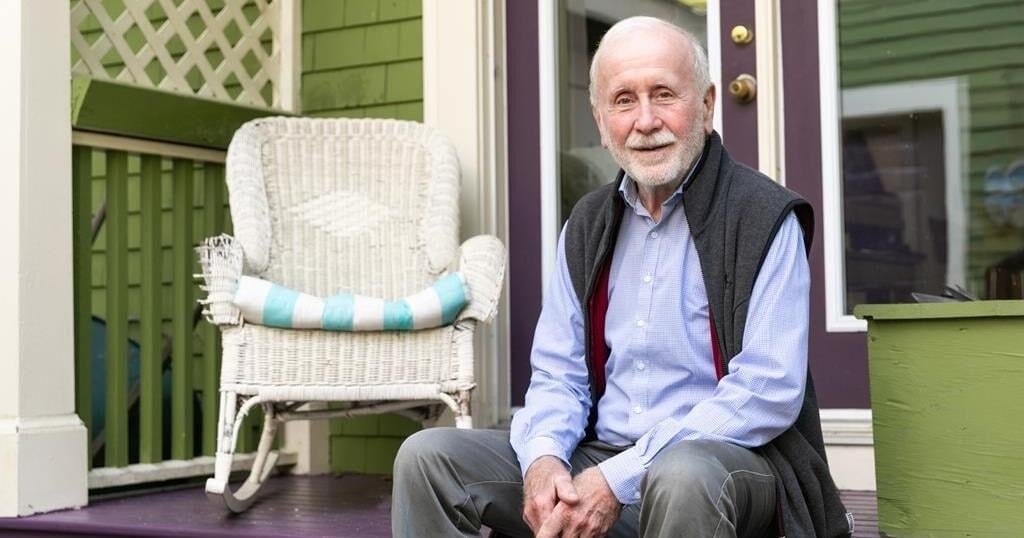HALIFAX – Nova Scotia economist Lars Osberg’s latest book on the widening gap between the very richest and the rest argues the trend is creating disappointed Canadians prone to distrusting one another and their governments.
In 1981, when Osberg published an earlier book — “Economic Inequality in Canada” — he noted the country was coming off four decades of growth, and inequality was stable.
Forty-three years later, his latest work — “The Scandalous rise of Inequality in Canada” (Lorimer) — describes a deepening chasm that is eroding the social cohesion needed to combat problems ranging from climate change to pandemics.
“What’s really changed has been the gulf between all Canadians and the top one-tenth of one per cent,” said the Dalhousie University professor during an interview at his office, where shelves are filled with books on the topic of inequality.
The consequence of “realizing there’s not much wealth left for you,” is a population that senses their aspirations will remain unfulfilled, the 78-year-old economist said.
“Disappointment occurs when actual events fall short of expectations,” he writes in the 286-page book.
Osberg begins by documenting how from the early 1980s to 2010, middle-class income levels stagnated, while the poor grew poorer in real dollars.
He cites the work of Quebec economists Jean-Yves Duclos — now federal minister of public services — and Mathieu Pellerin showing the wages of Canadians in the lowest-paid 10th percentile fell from an hourly average of about $14 to $13.62 from 1980 to 2010 — in inflation-adjusted dollars in the year 2021. The wages of the wealthiest 0.1 per cent grew from $180 hourly to $407, in real dollars, in the same time period.
The economist then cites income tax data indicating the income of the median wage earner inched up about $200 annually between 1980 and 2021, growing from almost $37,000 to $45,000. In the same period, there’s been a leap for the top 0.1 per cent, with data indicating annual incomes rising from $2.3 million to $8.8 million, an annual gain of $166,000 in 2022 dollars.
In a chapter titled, “Poverty and Inequality,” Osberg says wages have stagnated while social assistance has been”shredded” over the decades as employment insurance eligibility has tightened.
Osberg asks whether it matters if the wealthiest inhabit a sphere that the rest are excluded from. After all, there have been societies ranging from medieval Europe to Mogul India in which inequality endured for centuries.
However, the author finds inequality is growing much more quickly than in prior eras and, as a result, “ever-growing ostentation has to be expected” among the wealthy. This brings “unsatisfied aspirations,” as the middle classes sense they have fallen behind and pile up debt in a fruitless effort to keep up.
Osberg argues the rise in widespread advertising for luxury goods is simultaneously creating corrosive envy. High-end brands are widely marketed to ensure the majority of citizens become aware they can’t afford them. This in turn gives the items status among the one per cent, even if the luxury goods perform similar functions to less expensive brands, he writes.
In disappointed societies, citizens struggle to deal with issues like climate change or pandemics, both of which require a collective response, Osberg concludes. Meanwhile, populist politics hold greater appeal when mainline political parties don’t offer solutions, he adds.
Eventually, he predicts, voters whose needs go unmet “will turn to the extremes for solutions,” and as a result governments are tempted to use measures to repress their own populations through reduced civil liberties.
In his final chapter, “What to do?” Osberg takes a stance that echoes the British economist Tony Atkinson, a scholar of inequality who died in 2017. The author argues that the trend isn’t inevitable, but can be reduced with a suite of public policy changes.
He calls for shifts in the taxation system, including a return of inheritance taxes to Canada, as a viable method to capture massive amounts of wealth before they’re transferred to the next generation.
If “a true 65 per cent top tax rate” were brought in alongside meaningful attempts to reduce tax evasion, Osberg said the Canadian government could expect to collect extra revenues of up to $56 billion annually. The funds could go toward reducing the pressures on the poor and help fund a “participation income” system — through which poor and lower middle-class Canadians could receive a guaranteed income if they participate in the economy.
Finally, Osberg remains an advocate of economic policy that promotes high employment levels, higher minimum wages and a return to wage earners keeping a larger share of growth.
In his conclusion, the economist combines worry with hope, stating he believes Canada is still potentially “one of the best possible places to live.”
But he also writes, “It is possible that Canada’s elites will just double down on the failed economic policies of the past 40 years, and that inequality and insecurity will continue to increase, and that scapegoats and manufactured culture wars will for a while divert public resentments.”
This report by The Canadian Press was first published Sept. 25, 2024.
